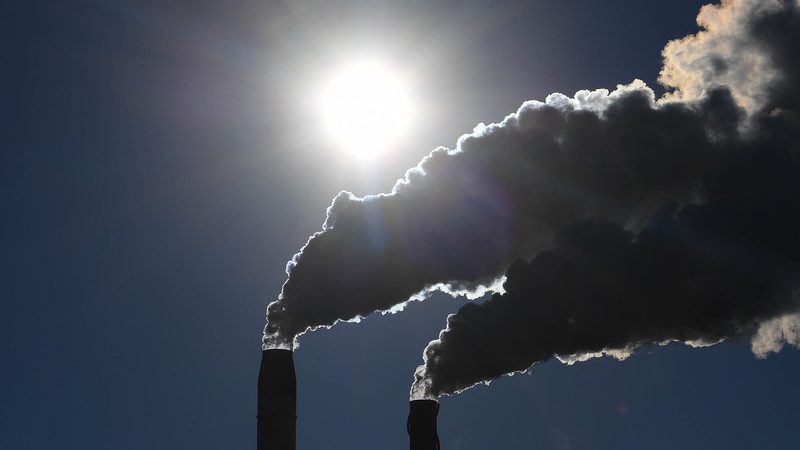Members of European steel association Eurofer and the European Aluminium Association have warned that the EU’s proposal on emissions trading and carbon border adjustment could decrease competitiveness and derail the green transition.
The European Commission has proposed reforms to the EU Emissions Trading System to align the market with its aim to cut greenhouse gas emissions by at least 55% by 2030 from a 1990 baseline.
The ETS will phase out free carbon allowances from 2026 to end in 2030 and put a ‘bonus-malus’ system into effect from 2025, which will reward companies that reduce emissions and penalize those that do not.
The Carbon Border Adjustment Mechanism, or CBAM, regulation will cover a number of sectors, including iron and steel, and aims to avoid carbon leakage and encourage countries to establish carbon pricing policies.
The proposals were backed by the European Parliament’s environment committee on May 18 and a full parliament vote will take place in June.
In an open letter to the European Parliament, over 50 steel company CEOs said the proposals undermined their capacity to invest in projects to reduce the sector’s CO2 emissions by at least 55% by 2030 and to achieve climate-neutral steel production in the EU by 2050 and would “derail the transition to green steel production in Europe.”
“These commitments represent a truly industrial revolution that requires a massive Eur30 billion ($32.1 billion) capital investment in breakthrough technologies over the coming eight years and a significant increase in operational costs stemming from the use of decarbonized electricity and hydrogen,” they wrote.
Favor international competitors
The proposals would weaken the industry’s carbon leakage protection in the domestic and global markets and favor international competitors that were not subject to equivalent carbon costs, the CEOs said.
EU carbon allowance prices climbed 139% in 2021 due to tighter future supply and increased demand. EU Allowances for December 2022 delivery were pegged at Eur83.59/mtCO2e ($89.51/mt) at the close May 30, according to Platts assessments published by S&P Global Commodity Insights, down from Eur84.15/mtCO2e on May 27.
The CEOs added that the new allocation rules in Europe would reduce the main CO2 benchmark by around 40% by adding one plant that was previously not in the scope and set a value that no company would be able to achieve in three years.
“This is due to a premature transition from the free allocation and indirect cost compensation system to a CBAM which has not yet been tested,” they said.
There were many risks that could undermine the CBAM’s effectiveness, including circumvention and resource shuffling, the CEOs said, adding that the CBAM also did not provide any measure to preserve the EU’s 20 million mt/year of steel exports, worth Eur45 billion.
It also did not capture the much-higher carbon footprint of stainless steel imports derived from the embedded alloying elements, they said.
“The proposals also remove massive allowances from the market, further driving the carbon and electricity price in Europe at a time when businesses and households are struggling with skyrocketing energy costs and inflation,” the CEOs wrote.
They called on the European Parliament to address these concerns to avoid scaling back existing carbon leakage protection until the CBAM’s effectiveness was proven, ensure a solution for exports was in place and prevent a sharp decrease in free allocation for existing steel plants.
They proposed that low carbon technologies should be rewarded without reducing prematurely benchmark values, at least in the first few years when technologies were being introduced at an industrial scale.
“The aforementioned changes to the ETS and CBAM will allow us to make the green steel transformation happen now within the EU. Our investments will greatly benefit climate protection, the EU’s industrial competitiveness, and hundreds of thousands of jobs across the EU,” they said.
Uncompetitive
European Aluminium warned in a separate statement that aluminum smelters would become cost uncompetitive if the CBAM covered indirect emissions and removed existing carbon leakage measures.
Costs for aluminum production in Europe were forecast to rise by 24% to 31% if, as implied under the proposal, indirect emissions were included in the CBAM and carbon leakage measures were fully phased out.
This could lead to a large share of EU production being replaced, because fossil fuel-based aluminum producers in third countries would pay less indirect carbon costs than European companies using decarbonized power.
In addition, the association said that the ETS would result in higher indirect carbon costs, which could result in primary aluminum imports for semi-fabrication possibly increasing up to 43%.
It insisted that, given the challenges the aluminum industry faced as an electricity-intensive industry, the CBAM should first be tested on direct emissions only, as originally intended by the European Commission.
The inclusion of indirect emissions should ideally be considered after 2030, when the European power grid was sufficiently decarbonized, European Aluminium suggested.
“Until we understand the real impact the CBAM has on downstream industries, we need to preserve, where applicable, existing national ETS compensation schemes,” European Aluminium Director General Paul Voss said.
— Jacqueline Holman, Ekaterina Bouckley






